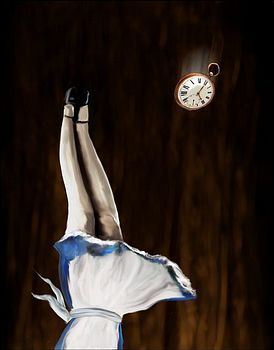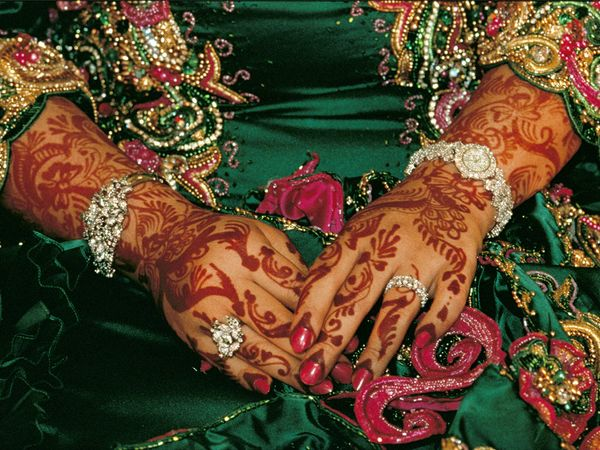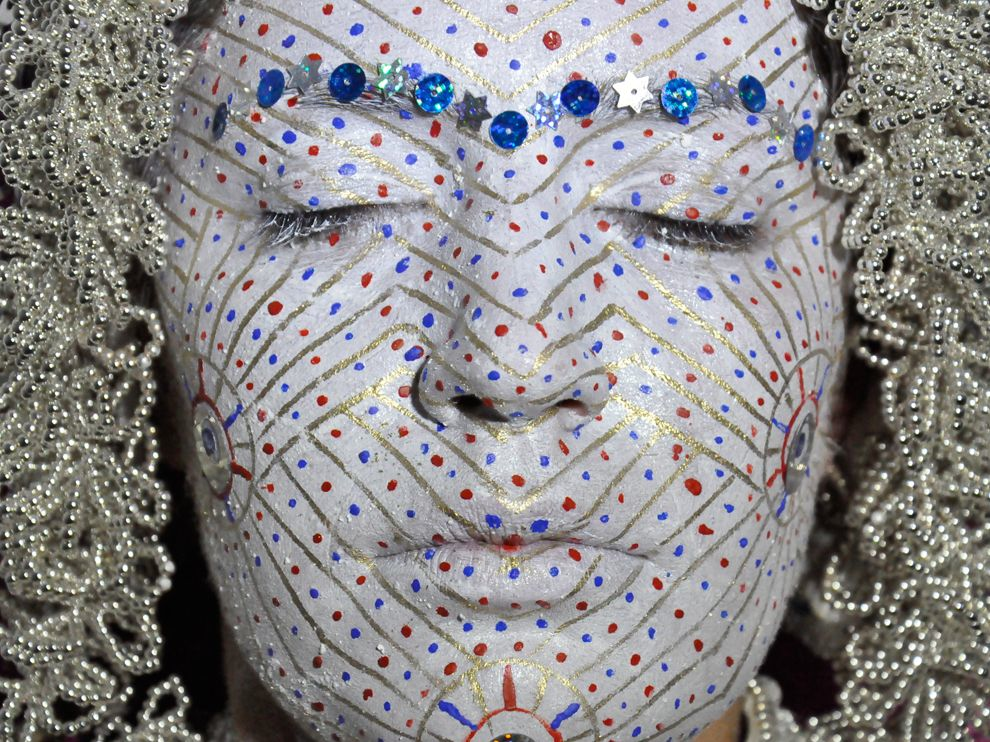The ability to be mesmerizingly beautiful and beautifully creative, strivings toward mastery of beauty, and wishes to be transformed into a beautiful being are universal desires. The quest for beauty is decidedly widespread and in many instances non-pathological.
Seekers of beauty often engage with activities or agents holding out the enticing the promise of re-invention, of ravishing physical or charismatic attractiveness. These may involve plastic surgery, beauty salon make-overs, diet gurus, elocution coaches, tattooing, personal athletic training, and psychotherapy.
Thinking about beauty and appearance are quite ordinary and prevalent. An example of this can be found in a recent speech by Hillary Clinton. Although Mrs. Clinton wants to be known for her political views, she joked that she would name her memoir “The Scrunchie Chronicles: 112 Countries and It’s Still All About My Hair.”
However there is a spectrum of interest and investment in creating beauty. Yearning for and pursuing beauty can become pathological. A psychotherapist differentiates between non-conflictual versus conflictual aspects of the pursuit of beauty.

Patients sometimes tumble into worlds where what had happened physically to their bodies mingled in fantastical ways with their self and object representations. The key to psychotherapeutically opening their looking glass (mirror) worlds often proved to be exploring their wishes for transforming their difficult physical experiences and subsequent body images into identities laden with beauty.
Manifest content in a clinical psychotherapeutic session may begin with a patient’s musings about beauty. What do I have to do to look like Kate Middleton, who married the future King of England? Was that a wrinkle that I saw when I first looked in the mirror this morning? Someone just told me that I look like my mother! I am having such a bad hair day.
Issues around hair as it relates to beauty (compare Hillary Clinton above) are surprisingly often a helpful initial entrée into a patient’s innermost self. An attuned therapist may be able to follow and eventually help the patient explore related issues around narcissism, gender and self identity, and/or sado-masochism.

Patients’ interest in hair, among other body parts and activities, is easily brushed aside with their readily available explanations about personal hygiene and presentation of a pleasing appearance. While such comments might very well have a basis in external reality concerning social acceptability, interest in hair is usually multi-determined.
Conflicts between sexual desires, superego prohibitions and punishments, as well as symbolic compromise formations, can readily find an exhibitionistic outlet in focussing on hair. Think about twirling long locks or flipping one’s hair while in the library or at a committee meeting. What is getting played out in concerns about hair straightening, hair color, hair thinning, hair length, and hair plucking?
Anal elements are among the components that may be displaced onto preoccupation with hair. Hair odors and other odors emanating from the body are noteworthy. This fact is of great significance to everyone, although the issue of smells is denied on both sides of the analytic couch, by most clinicians as well as by their patients, unless the smell is extreme and erupts in a blatant manner.
A number of patients report anal associations to experiences in a beauty salon. Ms. Q remarked that being diapered might have been like that: scents invading her nostrils as she was cleansed of her “toxins” – the more vigorously, the better, to rid her of dirt and foreign matter that had settled on her as she “mucked about” in her daily life. This patient’s analysis had begun to reveal anal concerns including conflicts about being penetrated and dirtied. For long periods, the transference was characterized by her insistence that the analyst was making her miserable by trying to dump nasty ideas onto her, to “force a load of crap” on her. Her ‘chance’ remark about the beauty salon suggested that that might be a place where she could partake of pleasure in fantasies of anal penetration, soiling, and purging. In that place there is no analytic exploration – only potential enactment.

Another patient, Ms. H, always washed her hair before going to the salon so that no one would see her “oily scalp.” She also showered twice before gynecological exams. Ms. H analogously tried to figure out themes before her therapy sessions so as not to show her “uncleansed mind.”
A clinician who is listening closely will often catch a reference to smells. He or she must be aware that prohibitions against consciously registering smells can be even more powerful than conscious awareness of reactions to smells. Smells that are consciously experienced as repulsive may be unconsciously beautifully entrancing.
The constant avoidance of smells results in constantly seeking smells, ostensibly to eliminate them, or to substitute one odor for another. This is the defense of doing and undoing. It is entirely possible that for adults, there is sensory deprivation in terms of smells. One has only to look at the vast array of personal body deodorants for sale, the advertisements for douches, or the endless designer perfumes chosen by professional ‘noses’ to observe the hunger for smells and to see the prohibitions and compromise formations which are wrought. The important infantile sensory gratification of smells is sought again and again. Listening for these clinical clues can be a pathway toward learning about early infant-mother attachment experiences.
Other arenas of self-beautification which can become pathologically addictive and suffused with sado-masochism have to do with exercise, diet, and fashion. It seems paradoxical that, for some people, wanting beauty must involve abuse, pain, and financial debt. However it is a fact that many people chain themselves to becoming excessively thin for example. Or they choose clothing which binds or distorts their bodies. The couture of Alexander McQueen illustrates this point.
For other people, body art/modification means tattooing, piercing, or surgery. When is a line crossed between enhancement of a beautiful self and mutilation? Plastic surgeries have existed for decades. Breast augmentation and reduction, facelifts, rhinoplasty, eyelid alteration, liposuction, buttocks lifting, buttocks implants, tummy tucks, skin peeling, hair transplants, and cosmetic dentistry are well known. There is gastric bypass surgery to promote weight loss and endoscopic surgery to end chronic blushing and sweating by destroying part of the sympathetic nerve system.
The New York Times reported on the newest frontier: cosmetic genital plastic surgery. Such elective “private sculpturing” can include “designer” vaginoplasty, or “vaginal rejuvenation,” to tighten vaginal muscles; “labia contouring” to plump or reduce labia or to make the labia more symmetrical; pubic liposuction; and hymen restoration.
Intense feelings of shame lie behind many body modification efforts. Emotional pain, fantasies which are felt to be shameful or ‘ugly,’ and negative ego and superego identifications can become expressed toward one’s own body. Fear of being looked at with contempt is accompanied by feeling intensely vulnerable to being exposed as injured and deficient. Disparagement of the body exists along a continuum between 1) distress over a ‘bad hair day’ and 2) suffering that reaches body hatred proportions.
Individuals with narcissistic difficulties can experience themselves as having defective bodies. They are desperate for a sense of wholeness. They may be unable to see a whole self reflected in the mirror. Instead they notice only parts of their bodies, most often their faces or hair. Their unconscious experiences are that particular body features might make up for psychic inadequacies. They focus on a particular imagined minor defect, as in body dysmorphic disorder. There is a lack of a fully integrated self concept and a lack of an understanding of others.
Treating a body part as a commodity or part-object, as a conveyor of loss-and-reparation, as sometimes happens in beautification procedures, can be thought of as a fetishization of a body part. There is a need for reinforcement and integration of the body ego, and a need for restoration of psychic primary narcissism. Narcissistic people struggle to control and master how they feel they appear to others, as attempts to control and master how they feel about themselves.
Presumably, psychotherapists are alert to their patients’ verbal as well as body language about beauty. On occasion, patients’ body talk and focus on becoming thin and stylish, or pursuing plastic surgery or having spa treatments, or undergoing body ‘cleansing’ might be viewed with scorn and seen as not worthy of much attention in psychotherapy treatment. However, cherished fantasies of being made beautiful – whether in the consulting room or in extra-analytic settings – are often transferential. Also, given that everyone is grounded in the body, fantasies about beauty reveal the force of the origins of cognition, thought, and language.
Certain kinds of problematic transference-countertransference enactments might result in psychotherapists overlooking or dismissing their patients’ interests in beauty. Some therapists begin to feel jealous of patients’ physical involvement with outside experts, or they assume, rightly or wrongly, that the activities are resistance to therapy. Sado-masochistic struggles between analysts and patients then become more likely. Narcissistically vulnerable patients easily imagine being judged or attacked if they sense that their analysts feel displeasure toward beauty pursuits. They also feel perplexed if their analysts do not see the innate value of their enthusiasm for such enhancement.
Some analysts are concerned that attention to bodies could stir up their own body issues, sensations, or potential bi-sexual identifications and predilections. There can be rigid countertransference defenses against being drawn into patients’ sensitivity to both of their bodies. Comparisons of which one looks dowdy or over weight, for instance, can evoke significant embarrassment, and deflection of the subject.
A related example leading to difficulties in perceiving beauty issues in psychotherapeutic treatment has to do with fantasies that the therapist is neuter and de-sexed. Either person in the dyad may experience prohibitions against looking beautiful or associating to beauty and sensuality in clinical sessions.
Envy may occur in either person. Who is more beautiful? Who has the time or money to ‘indulge’ in beauty treatments? Who feels freer of inhibitions and guilt about creating a beautiful self? Envy may also arise around comparisons of an infinite variety of factors: wealth, prestige, athletic prowess, successful children, or youthfulness. What fantasies about bodies contribute to such comparisons?
Psychotherapists mush be multi-lingual: fluent in the many languages which bodies and brains speak. They must have the enthusiasm to work with patients where they are at any moment.
Neuro-psychological research has proven what clinicians have always known: in the right setting, patients can keep growing in authentically fulfilling ways throughout their lives. It turns out that their therapists can too.
Ellen Sinkman, LCSW, is a Training and Supervising Psychoanalyst, and a member of the International Psychoanalytic Association (IPA), Contemporary Freudian Society (CFS), Institute for Psychoanalytic Training and Research (IPTAR), and the American Psychoanalytic Association. She is in the full-time private practice of psychoanalysis and psychotherapy in New York City and in Westchester. Author of: The Psychology of Beauty: Creation of a Beautiful Self (2012, Jason Aronson).

Your web page and the way you relate art to psychotherapy was very inspiring . Your way of looking at the world of psychoanalises its simbols and meanings was a beautiful reading experience. I have a facebook page where I interpret dreams . Just very simple interpretation using psychoanalytical concepts and their simbols a game an exercise , your words about beauty gave me an other dimension. (Interpretações de SONHOS além da lenda…)